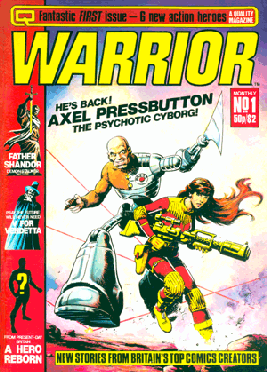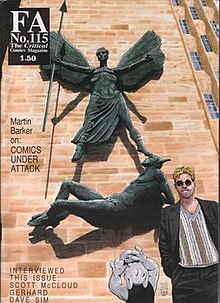
A fanzine is a non-professional and non-official publication produced by enthusiasts of a particular cultural phenomenon for the pleasure of others who share their interest. The term was coined in an October 1940 science fiction fanzine by Russ Chauvenet and first popularized within science fiction fandom, and from there the term was adopted by other communities.

Warrior was a British comics anthology that ran for 26 issues between March 1982 and January 1985. It was edited by Dez Skinn and published by his company Quality Communications. It featured early work by numerous figures who would go on to successful careers in the industry, including Alan Moore, Alan Davis, David Lloyd, Steve Dillon, and Grant Morrison; it also included contributions by the likes of Brian Bolland and John Bolton, while many of the magazine's painted covers were by Mick Austin.

Comics Buyer's Guide, established in 1971, was the longest-running English-language periodical reporting on the American comic book industry. It awarded its annual Comics Buyer's Guide Fan Awards from 1983 to circa 2010. The publication ceased with the March 2013 issue. The magazine was headquartered in Iola, Wisconsin, after originally being published in the Quad Cities region.
Derek "Dez" Skinn is a British comic and magazine editor, and author of a number of books on comics. As head of Marvel Comics' operations in England in the late 1970s, Skinn reformatted existing titles, launched new ones, and acquired the BBC license for Doctor Who Weekly. After leaving Marvel UK, Skinn founded and edited Warrior, which featured key works by Alan Moore.

Trident Comics was a short-lived comic book publishing company based in Leicester, UK. Specialising in black-and-white comics created by new British talent, it was formed in 1989 as an offshoot of the comics distributor/wholesaler Neptune Distribution, and went out of business in 1992 when Neptune was acquired by a competitor.

Starburst is a British science fiction magazine published by Starburst Magazine Limited. Starburst contains news, interviews, features, and reviews of genre material in various media, including TV, film, soundtracks, multimedia, books, and comics books. The magazine is published quarterly, with additional news and reviews being published daily on the website.

The Daredevils was a comics magazine and anthology published by Marvel UK in 1983. Aimed for a more sophisticated audience than typical light superhero adventures, The Daredevils featured Captain Britain stories by Alan Moore and Alan Davis paired with reprints of Frank Miller's Daredevil stories. It has been speculated this was in response to Dez Skinn's new anthology Warrior.
The Eagle Awards were a series of British awards for comic book titles and creators. They were awarded by UK fans voting for work produced during the previous year. Named after the UK's seminal boys' comic Eagle, the awards were launched in 1977 for comics released in 1976.
Paul Neary was a British comic book artist, writer and editor.
Richard Burton is a British comic publisher and editor who had a lengthy career at IPC Magazines. While an assistant editor at 2000 AD, he became known to readers as Tharg the Mighty's bumbling assistant Burt, who appeared in a number of strips with him. Earlier in his career, Burton published the popular fanzine Comic Media News, and was a co-founder of the Eagle Awards.
Dark They Were and Golden Eyed was a science fiction bookshop and comic book retailer in London during the 1970s; the largest of its kind in Europe. Specialising in science fiction, occultism, and Atlantis, the central London shop also played a key role in bringing American underground comics to the United Kingdom. It also sold American editions of mainstream science fiction books that were not easily obtained anywhere else.

The Comic Reader (TCR) was a comics news-fanzine published from 1961 to 1984. Debuting in the pre-direct market era, TCR was the first regularly published comics industry news fanzine, and was able to secure many contacts from within the ranks of the larger publishers. As TCR increased in popularity and influence, it was able to attract professional artist to illustrate the covers. TCR also proved to be a launching pad for aspiring comic book creators, many of whom published work in the fanzine as amateurs. Contributors from the world of fandom included founding editor Jerry Bails, key editor Paul Levitz, Paul Kupperberg, Tony Isabella, Byron Preiss, Neal Pozner, Don Rosa, Carl Gafford, and Doug Hazlewood.
The British Amateur Press Association was an amateur press association created by comics fans in late 1977, following a proposal from Phil Greenaway in the letter pages of the comics fanzine BEM; the first mailing was circulated in January 1978. Greenaway was the first Central Mailer and his successors included Maureen "Mo" James, Howard Stangroom, Les Chester, and Steve Green. For most of its existence, up to thirty members of BAPA submitted multiple copies of at least two A4 pages to the central mailer every two months. BAPA was disbanded on 17 August 2004, with a final mailing distributed early in 2005. A one-off publication was also distributed under the name B-APA (sic) in 2005, in memory of Andy Roberts; a similar publication was announced in 2008, in memory of Steve Whitaker.

The British Comic Art Convention was an annual British comic book convention which was held between 1968 and 1981, usually in London. The earliest British fan convention devoted entirely to comics, it was also the birthplace of the Eagle Awards.

Rocket's Blast Comicollector (RBCC) was a comics advertising fanzine published from 1964 to 1983. The result of a merger with a similar publication, RBCC's purpose was to bring fans together for the purpose of adding to their comic book collections. It also proved to be a launching pad for aspiring comic book creators, many of whom corresponded and exchanged their work through RBCC, and published work in the fanzine as amateurs.

Speakeasy was a British magazine of news and criticism pertaining to comic books, comic strips and graphic novels. It published many interviews with both British and American comics creators.
Martin Lock is a British comic book critic, writer, and publisher. As publisher of the fanzines BEM and Fantasy Advertiser, and then publisher of Harrier Comics, he was an important figure in British comics fandom in the 1970s and 1980s.

BEM, originally known as Bemusing Magazine, was a British fanzine focused on comic books which was published from 1973 to 1982. The brainchild of Martin Lock and billed as "The Comics News Fanzine," BEM featured American and British comics industry news and gossip, interviews, comic reviews, essays, columns, and comic strips.
Comic Mart is the catchall term for a series of British comic book trade fairs which were held in the United Kingdom from 1972 until the early 1990s. The Comic Mart was one of the earliest recurring public comic events in the UK, predated only by the British Comic Art Convention. Comic Mart began in London, eventually expanding to Birmingham, Manchester, and Liverpool, among other locations. The first few Comic Marts were organized and produced by Rob Barrow and Nick Landau; eventually they split up to produce competing versions of the event, and were joined by other regional organizers.
The House of Hammer was a British black-and-white magazine featuring articles and comics related to the Hammer Film Productions series of horror and science fiction films. The brainchild of Dez Skinn, almost every issue of the magazine featured a comics adaptations of a Hammer film, as well as an original comics backup story, such as the long-running feature Van Helsing's Terror Tales.











